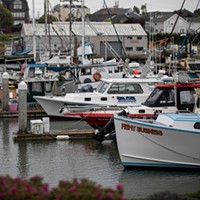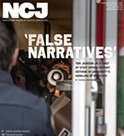[
{
"name": "Top Stories Video Pair",
"insertPoint": "7",
"component": "17087298",
"parentWrapperClass": "fdn-ads-inline-content-block",
"requiredCountToDisplay": "1"
}
]
Getting in or under water offers an almost instant separation from the literal and figurative, gravity of life on firm ground. Whereas a mountain bike ride or trail hike may take some time to truly detach from our everyday lives, getting into the ocean offers an instant sense of separation. Sight, sound and motion are immediately impacted as you begin to explore the underwater world.
My abalone equipment has hung lonely and dormant in my garage since 2017. For a variety of reasons, including the kelp they need being devoured by purple urchins, their population is so dramatically down that the next season is, at best, 2026 ("Still Downhill," Jan. 12, 2023). Diving for abalone had been my favorite way to experience the life aquatic. The hunt for these giant sea snails takes you into an underwater world illuminated (visibility willing) by the beautiful hues of purple and green sea life. Each dive lasts as long as you can hold a single breath. But in that breath, assuming you're in decent diving condition, you're in another world.
After thinking about taking up spearfishing as an alternative to ab diving for some time, I finally decided to take the plunge. The equipment (wetsuit, fins and a dive belt) is largely the same, simply substitute a speargun for an abalone iron. But, while both pursuits find you underwater on a single breath, that's where most of similarities stop. Each pursuit has its own considerations. (For information on getting your required fishing license and to view current regulations, visit wildlife.ca.gov.)
While there's no shortage of resources to learn about spearfishing, websites, how-to books, periodicals, etc., my preferred and most effective learning method is conversation or storytelling. Listening to someone who's garnered years of experience in a particular region could mean the difference between coming home with your catch or not coming home.
I learned how to abalone dive from a like-minded neighbor 20 years ago. However, for this new adventure, I was coming up short. I turned to a YouTube search. "Spearfishing Humboldt" brought up only a few videos and I only found one person who had recently posted, Tyler Grunert. He very graciously agreed to a call to talk about his experiences as a North Coast spearfisherman.
An abalone diver as well, Grunert was willing to share some of his wisdom. Grunert's grasp of the sport, specifically for these waters, is expert level. He shared tales of diving our cold-water coast and other aspects of spearfishing, but it was his commentary on the marine life considerations that struck me.
Several years ago, Grunert instructed a newbie "spear-o" like myself to avoid the North Jetty at the opening to Humboldt Bay. He said great white sharks tend to cruise that area near the dolos towards the end. If you're going to dive the opening to the bay, dive along the South jetty. His buddy ignored that advice, did indeed dive along the North Jetty and came back from a shark encounter with all limbs intact but in need of a new speargun. And probably a new wetsuit as well.
Grunert warned me matter-of-factly to be wary of sea lions, too. Though less lethal than a shark, sea lions are adept, acrobatic swimmers. They're also territorial and aggressive. A sea lion can steal your catch and leave you with a nasty bite in the blink of an eye. Sea lions, he said, love octopus, which was a nice segue into octopus management.
The giant Pacific octopus can grow to more than 100 pounds and 14 feet across. If, within the underwater crags and caves, you see the underside of the octopus tentacles with its suckers facing out, it may be poised to attack. Even the smaller ones can cause you problems. He noted these highly intelligent cephalopods have been known to rip off diver's masks on occasion.
I'm looking forward to immersing myself in this new sport later this spring. I feel more comfortable when I think about approaching the waters of the North Coast having spoken with Grunert. It was a great reminder of the value of skill sharing and community. I am truly grateful to those who have a willingness to pass along their experiences and lessons to help others.
Josiah Bunting (he/him) is a freelance writer based in Northern California. Find him on Instagram @ColdWaterCoast.



































